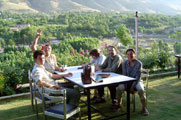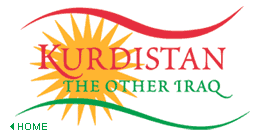Iraqi Kurds Go Their Own Way, Wooing Investors to Safe North
By Brian Mitchell, 1 August 2006
The tiny town of Shaqlawa had 1.2 million visitors last summer, mostly from other parts of Iraq. They came for the mild climate and mountain vistas, but the big draws were peace and safety.
Shaqlawa is in Kurdistan, a fertile region of northern Iraq that was once the target of Saddam Hussein's chemical attacks. Since the Gulf War, Kurdistan has been largely on its own. Iraq's new constitution gives the region virtual independence, which the local Kurds are eager to exploit with foreign investment.
"We know what the potential is," said Bayan Rahman, chairman of the Kurdistan Development Corp. "We know what we had before, and we know what's needed in Iraq."
Open, Safe For Business
The KDC has funded a major ad campaign in Britain and the U.S. to thank both countries for overthrowing Saddam and to introduce investors to "the Other Iraq." Kurdistan has its own parliament, legal system, security forces and revenue sources. It hosts just a handful of coalition soldiers; not one has been kidnapped or killed in Kurdistan since the invasion.
Violence has flared just outside the region, in Kirkuk, where Kurds and Arabs mix uneasily. Saddam drove out hundreds of thousands of Kurds from the oil-rich city during his reign. Many have returned since his ouster.But in the north, where Kurds rule, local authorities have kept a tight lid on things.
"The reason they're so safe and secure is that they pretty much have a six-deep system of roadblocks that makes certain that people who create trouble don't get in," said Andrew Apostolou, a Washington analyst on Iraq.
Kurds also are far different from the Arabs of the south. They speak an Indo-European language similar to Farsi and claim descent from the ancient Medes. They had an empire of their own five centuries before Christ, but have been a subject people since. Today the world's 30 million Kurds are divided among several Mideast countries. About half live in eastern Turkey. Most of the rest live in Iran, Iraq and Syria.
Kurds make up 15% to 20% of Iraq's population.
Most Iraqi Kurds are Sunni Muslims. Some practice an ancient pagan religion, Yazdanism. There are also a few Christians and Jews. But most are Kurds before anything else. "Religion actually isn't the issue for us. It's a private matter," Rahman said. Kurdish separatism invited trouble from Baghdad until the 1991 Gulf War. The Kurds then came under U.S. protection, but they still lived in Saddam's shadow.
"Where my parents lived, if they looked out of the window, they could see the tanks half an hour's drive away," Rahman said. "While we were out of his grasp, the fear was always there that he would come back. Now things have changed."
Business is picking up in the region's leading cities.
When the region opened its first international airport near Erbil a year ago, planners expected one arrival and departure a week. Now they see about 65 to 70 flights a week to a dozen or more destinations. You can fly directly to Frankfurt, Germany; Stockholm, Sweden; Copenhagen, Denmark; Vienna, Austria; Athens, Greece; Istanbul, Turkey; Amman, Jordan; and Tehran, Iran.
The extra traffic has boosted demand for hotel and office space. Firms make do by renting apartments and villas. "While there is still a long way to go, things are moving at a much faster pace," said the KDC's Douglas Layton.
Untapped Crude
Kurdistan has proven reserves of oil and gas, which are only now being developed by Norwegian, Turkish and British firms. The region was once the breadbasket of Iraq, but agricultural output dived under Saddam. The United Nations' oil-for-food program was also hurt by depressing prices.
To woo investors, the region's parliament recently passed a 10-year tax holiday on new investments. The law, which isn't subject to Baghdad's approval, also lets foreign firms own land and repatriate 100% of profits. "What they've got at the moment is pretty good. They've got a de facto form of independence," Apostolou said. "They can pretty much do as they please."
Clickhere for press enquiries. |
Quote
|

Tourists relaxing at the Shaklawa Resort in Kurdistan
 The tiny town of Shaqlawa had 1.2 million visitors last summer, mostly from other parts of Iraq. They came for the mild climate and mountain vistas, but the big draws were peace and safety.
The tiny town of Shaqlawa had 1.2 million visitors last summer, mostly from other parts of Iraq. They came for the mild climate and mountain vistas, but the big draws were peace and safety.

 The KDC has funded a major ad campaign in Britain and the U.S. to thank both countries for overthrowing Saddam and to introduce investors to "the Other Iraq." Kurdistan has its own parliament, legal system, security forces and revenue sources. It hosts just a handful of coalition soldiers; not one has been kidnapped or killed in Kurdistan since the invasion.
The KDC has funded a major ad campaign in Britain and the U.S. to thank both countries for overthrowing Saddam and to introduce investors to "the Other Iraq." Kurdistan has its own parliament, legal system, security forces and revenue sources. It hosts just a handful of coalition soldiers; not one has been kidnapped or killed in Kurdistan since the invasion.

 When the region opened its first international airport near Erbil a year ago, planners expected one arrival and departure a week. Now they see about 65 to 70 flights a week to a dozen or more destinations. You can fly directly to Frankfurt, Germany; Stockholm, Sweden; Copenhagen, Denmark; Vienna, Austria; Athens, Greece; Istanbul, Turkey; Amman, Jordan; and Tehran, Iran.
When the region opened its first international airport near Erbil a year ago, planners expected one arrival and departure a week. Now they see about 65 to 70 flights a week to a dozen or more destinations. You can fly directly to Frankfurt, Germany; Stockholm, Sweden; Copenhagen, Denmark; Vienna, Austria; Athens, Greece; Istanbul, Turkey; Amman, Jordan; and Tehran, Iran.

 Kurdistan has proven reserves of oil and gas, which are only now being developed by Norwegian, Turkish and British firms. The region was once the breadbasket of Iraq, but agricultural output dived under Saddam. The United Nations' oil-for-food program was also hurt by depressing prices.
Kurdistan has proven reserves of oil and gas, which are only now being developed by Norwegian, Turkish and British firms. The region was once the breadbasket of Iraq, but agricultural output dived under Saddam. The United Nations' oil-for-food program was also hurt by depressing prices.

|
|


